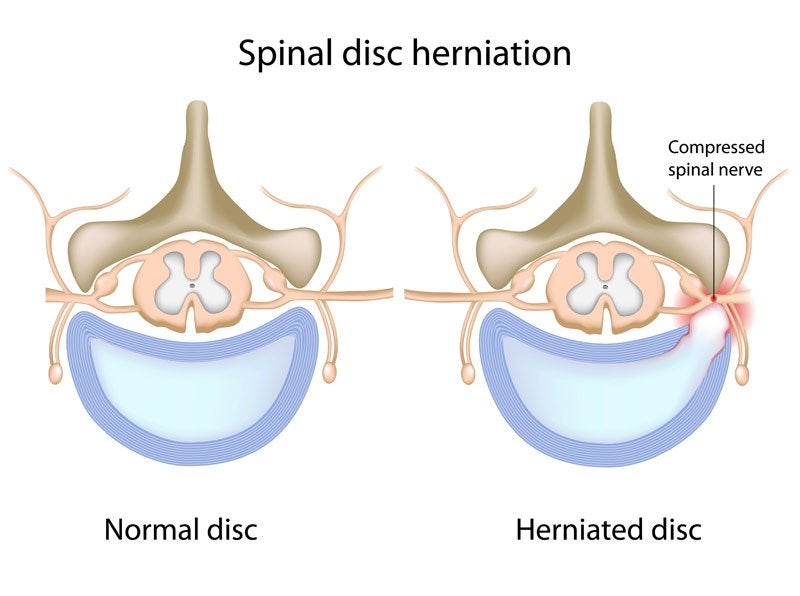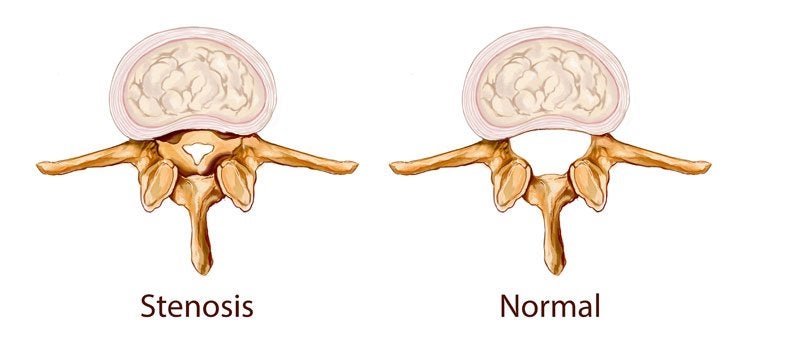Back and neck injuries are the most common musculoskeletal problems. In fact, 80 percent of people will experience back pain at some point in their lives. Pain occurs when the spine, a complex structure of vertebra, disks, the spinal cord, and nerves, is abnormal. When this happens, turning, bending, standing, and lifting become difficult and painful.
The most common problems are herniated disks and stenosis.
Herniated Disks

The spine is made up of a series of small bones that stack one upon the other. Between each of the bones are rubbery cushions called disks. Each disk is firmer on the outside and softer on the inside. If a tear occurs in the outside part and the soft inside part pushes out of the tear, it’s called a herniated disk. When the disk is herniated, it rubs up against nearby nerves leading to pain and sometimes numbness or tingling. While the pain and numbness are often felt in the arms or legs, the cause is coming from the spine. While most herniated disks occur in the back, called Herniated Lumbar Disk, they can also occur in the neck, called a Cervical Herniated Disk.
Diagnosing a Herniated Disk
A physician will perform a physical examination and check the patient’s strength, reflexes, walking, and response to light touch and pinpricks. The physician may also order an x-ray, MRI, or CT scan. These tests can help the doctor know exactly where the herniation is, and how far out it is protruding. Sometimes, if damage to the nerve is suspected, nerve conductions studies can be performed to determine exactly where the damage is occurring.
Treating a Herniated Disk
Often, people recover from herniated disks by taking medication and limiting the positions that cause pain. Sometimes, physical therapy also helps. When these treatments don’t work, surgery is an option. During surgery, a neurosurgeon removes the portion of the disk that is protruding. This relieves the pressure on nerves and the resulting pain and discomfort go away.
Stenosis

Spinal stenosis occurs when the open part of a person’s spine (spinal canal) becomes narrowed and usually occurs in people who are over 50. The narrowing puts pressure on the nerves that go to the arms and legs, leading to tingling, pain, and discomfort. When stenosis occurs in the back it is called Spinal Stenosis and affects the legs. When it occurs in the neck it is called Cervical Stenosis and affects the arms.
Diagnosing Stenosis
A physician will conduct a physical exam and will order one or more diagnostic tests such as x-rays, and MRI, or a CT scan. The results tell the doctor exactly where the narrowing is occurring.
Treating Stenosis
Often, people with stenosis take medication to relieve pain and reduce inflammation. Steroid injections and physical therapy can also help. For those who do not find relief from these treatments, surgery is an option. The goal of surgery is to relieve pressure in the spinal column by opening up more space inside the spinal canal. There are several types of surgery that accomplish this, and a person’s surgeon will talk with them about which is the best option for their individual diagnosis.
Departments and Programs Who Treat This Condition
Neurosurgery
Neurology
General Neurology
Pediatric Sports Medicine Clinic
 ht
ht 
 English
English Français
Français Deutsch
Deutsch Italiano
Italiano Español
Español Tiếng Việt
Tiếng Việt